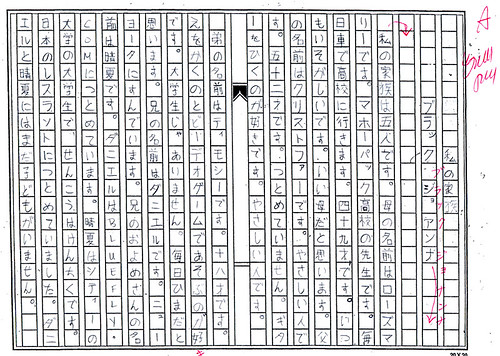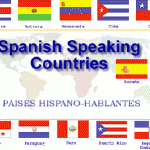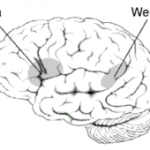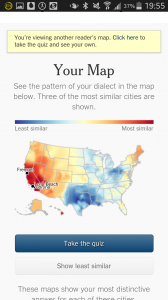Archives
now browsing by author
Blog 4 – Keana Sabin
When I was young, my parents made the mistake of only teaching me English rather than their natives tongues, Japanese and Tagalog. Because of school I had to learn a language and my parents pressured me to choose between the two languages. I chose Japanese.
Just like any other language you have to learn the language’s alphabet. Before learning Kanji, I had to memorize Hirigana, then Katakana.
http://16991978arwuws.files.wordpress.com/2010/08/i132831034_93948_52.gif
To remember hirigana and katakana, my senseis would play videos to help us remember. Like this:
https://www.youtube.com/watch?v=plvSpVSdJWU
Japanese seemed easy because you learn simple phrases and words like this:
https://www.youtube.com/watch?v=MYiEcPEZS2U
My opinion Japanese changed when I noticed the grammar is quite difficult to remember. I had a hard time remembering where to correctly place particles within my sentences. If it wasn’t that there’s certain ways speakers must structure their sentences to either appear polite or passive, or express past or present.
http://learnjapanese.com/grammar
It’s also really important that words are pronounced correctly otherwise they could mean something else or just sound weird to native speakers:
https://www.youtube.com/watch?v=QU34Rw-hF64
When taking Japanese classes at SDSU, I noticed lesson plans weren’t as simple as the ones in community college. SDSU teachers expected students to remember and write skits about holidays, customs and apply certain etiquettes (like in the links below). You only learning so muhc in class…Not having enough knowledge of certain vocabulary and sentence structure really made it difficult making a legitimate script that correctly corresponded and expressed presentation topics. Half the time my fellow classmates didn’t understand what was being presented.
Japanese bowing: https://www.youtube.com/watch?v=vdlNZJ_TFXU
White day: https://www.youtube.com/watch?v=IxtT9lK2rIs
It wasn’t skits we had to write essays. Japanese essays aren’t written left to right but rather right to left.
Examples:
On the right it goes title and then name and whatever you have to write about. Indenting is needed in particular areas.

https://www.flickr.com/photos/joannablack/2494295168/
http://qcpages.qc.cuny.edu/~tyabe/jpn03/items/genkouyoushi.pdf
Other things about Japanese:
Among the languages spoken around the world… Japanese isn’t one of the top spoken languages. The top spoken languages of our world is English, Russian, Spanish, Portuguese, Chinese, Arabic and German.

http://bemoneyaware.com/images/world/language.jpg
Many say use anime to learn Japanese. It’s quite exciting when you can understand sentences, phrases and words.
http://www.wikihow.com/Learn-Japanese-Using-Anime
Common Japanese words used wrong:
http://anime.about.com/od/animecommunity/tp/10-Japanese-Words-Otaku-Get-Totally-Wrong.htm
Blog 1
Growing up my parents raised me to speak English because they didn’t want me to go through their difficulty they experience when trying to communicate in English. My mom is a native speaker of Tagalog while my father speaks in Pidgin/Hawaiian slang and little Japanese but either way their English is considered poor. As years past my parents realized they made a mistake of just teaching me English and found out it was better to be accustomed to other languages. They began speaking to and teaching me in their native tongue but they were a bit late. I’m able to understand Tagalog but have difficulty responding back and I just rejected Pidgin all together because it’s not useful unless you live in Hawaii. Understanding Tagalog has it’s up and downs. It helps me know what my mother wants when she can’t communicate properly in English and let’s me know when people are talking bad about me. I work in retail and knowing Tagalog makes Filipino customers engage with you more but also wanting discounts and such.
Besides picking up Tagalog, I decided to learn Japanese because it’s a lost language within my father’s side of the family. Overall Japanese is a difficult language to learn but learning the culture and customs have been worthwhile. Being a native of San Diego, it just makes sense to be familiar with “our slang.” Talking in slang is favorable in some cases because it makes more easier to communicate with your peers and appear more approachable but obviously talking in slang usually doesn’t work in your favor when talking to adults unless they’re okay with it.
Through my other experiences I learned the language can just be a burden. I experienced this within my own family because I don’t speak Pidgin or how my Hawaiian relatives do so our communication tends to be broken or just listening to them tends to be annoying. In school I’ve had groups where some members rather speak in their native tongue leaving either me and/or multiple members left out of the group work. At work, language also tends to be an issue if they don’t speak English. I’ve had customers communicate extremely slowly or fail entirely altogether and get both frustrated and mad at me and belittle me. So my language experiences are changing each day.






 D5 Creation
D5 Creation